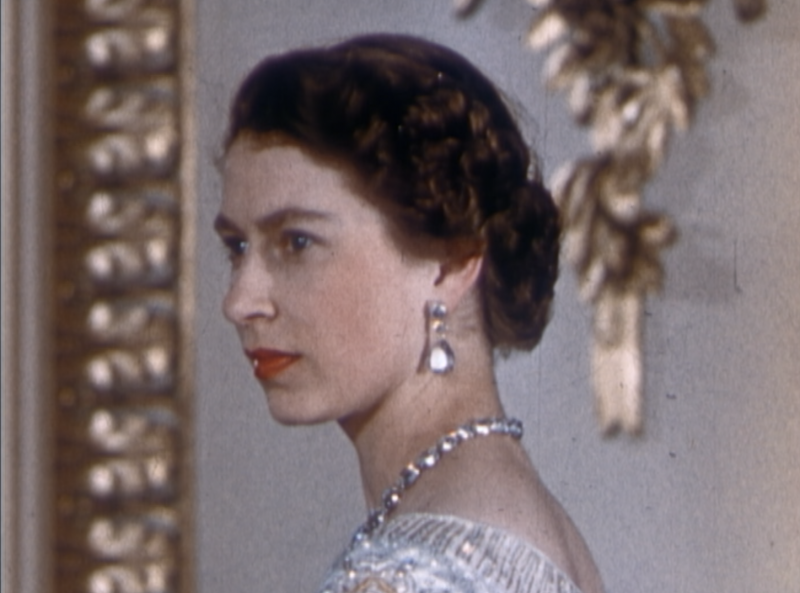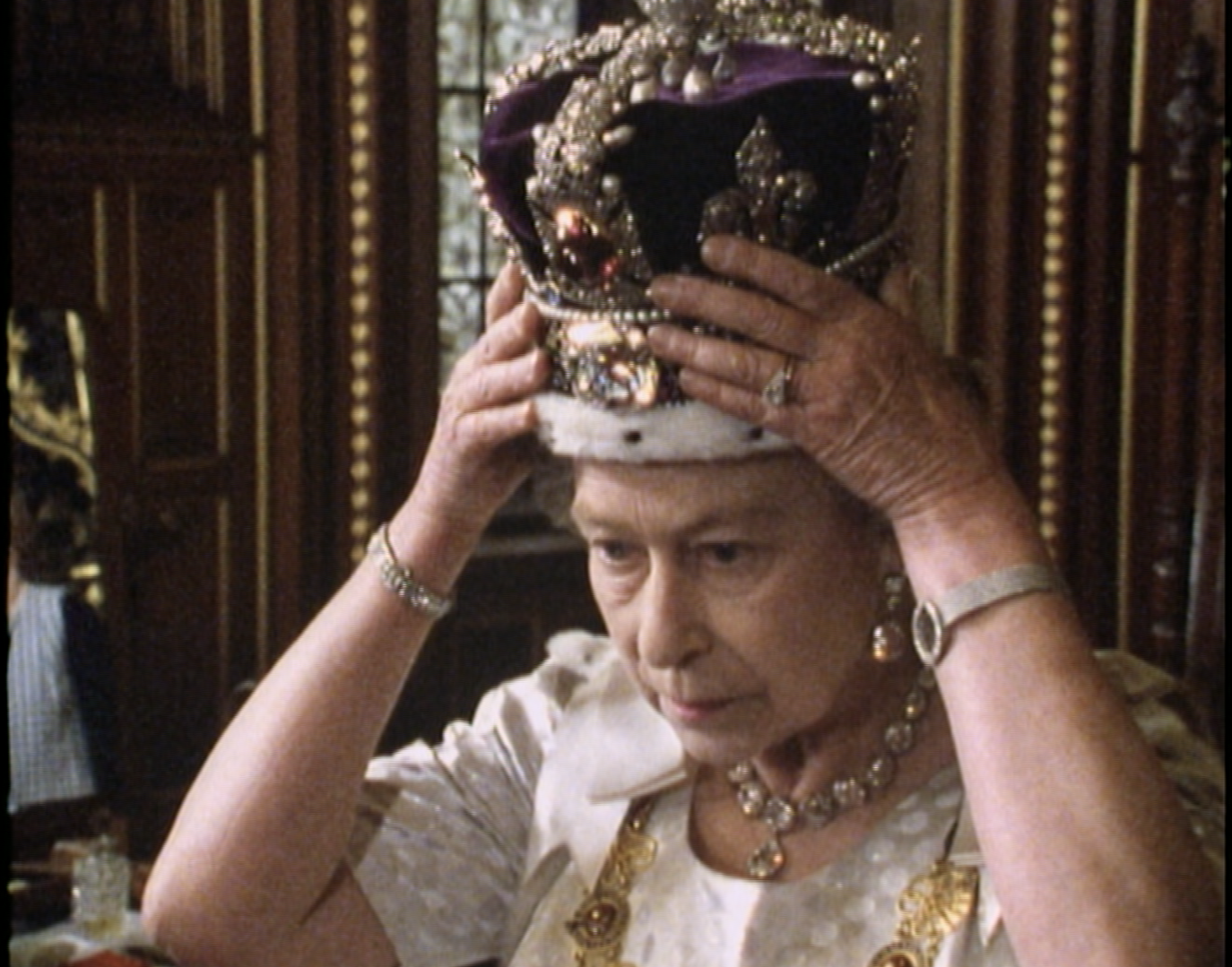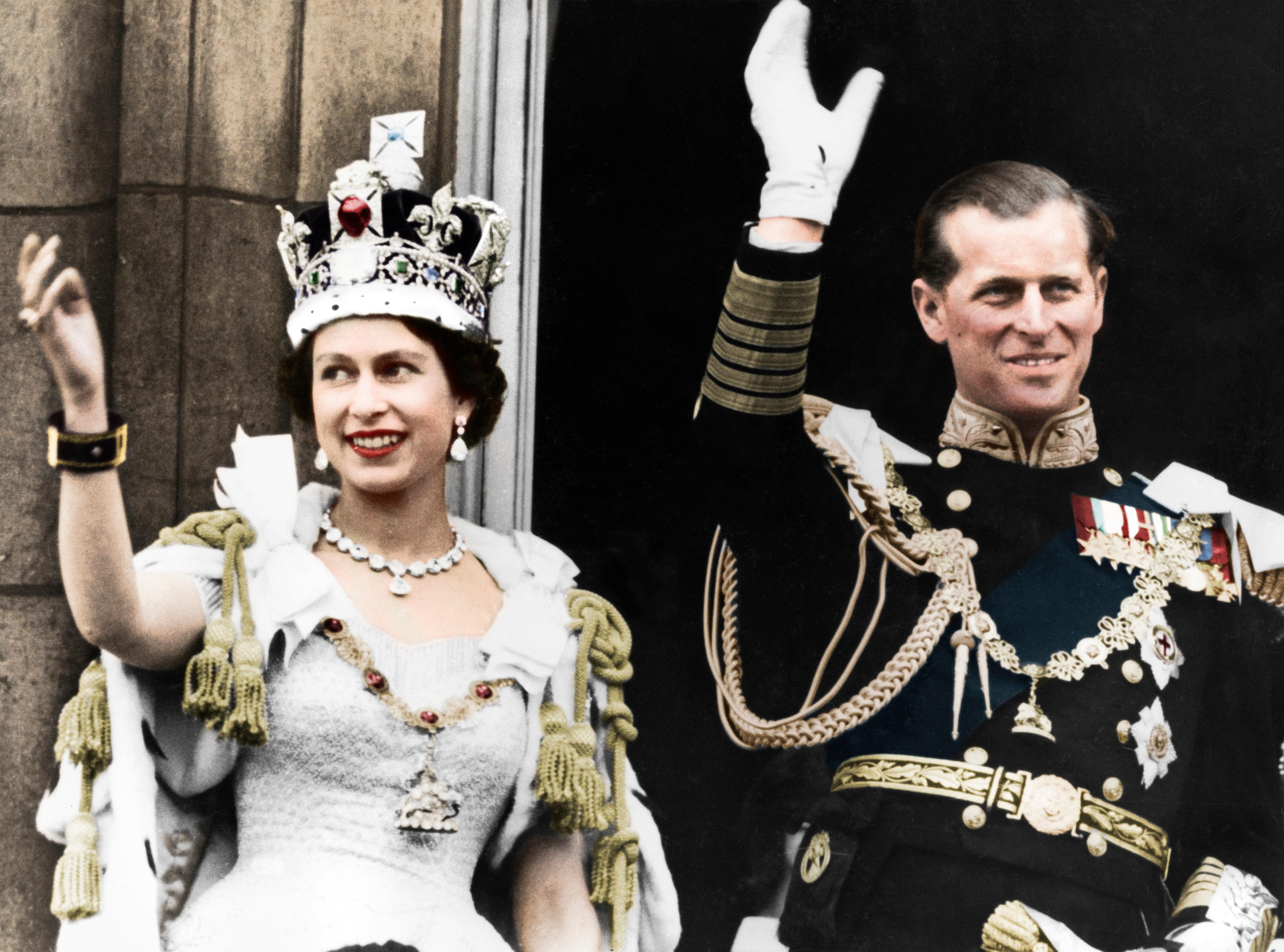Elizabeth: A Portrait in Parts review - she is a human being | reviews, news & interviews
Elizabeth: A Portrait in Parts review - she is a human being
Elizabeth: A Portrait in Parts review - she is a human being
Roger Michell's swansong is a curious, humane jubilee collage

Roger Michell’s films described a range of Englishness, from Notting Hill’s foppish comedy to acerbically humane Hanif Kureishi scripts (Venus, The Mother, The Buddha of Suburbia), Cornish Gothic (My Cousin Rachel) and his last feature, The Duke, which warmed working-class malcontent Jim Broadbent and Helen Mirren’s frozen marriage with Wellington’s stolen portrait.
The Duke’s docu-slivers of early ‘60s London dovetail into this film, finished the day Michell died. Other subjects were considered: Nick Drake, or apartheid-busting cricketer Basil D’Oliveira. It might as well be the Queen, approached here as an English person and prism – “the stuff of our dreams, our projections,” Michell wrote, “by far the most famous female face in the history of the world…the Mona Lisa…a cult: like Mao, like Stalin, like Marilyn…our collective Mother”.
The arresting opening splices backflipping royal impersonators and that Olympics Bond parachute drop – Danny Boyle’s perfect patriotic coup – set to Robbie Williams’ “Let Me Entertain You”. This isn’t a Julien Temple film, though, dodging Johnny Rotten’s jubilee jeremiad “God Save The Queen”, and neither punkishly disloyal not forelocking-tugging. The defenestrating brilliance of Temple’s underground history of these Isles as a rock rogue’s gallery, his jagged immersiveness, is ignored for editor Joanna Crickmay’s quieter rhythms. The mood is quizzical, curious, humane, and no more interesting than its subject. There’s Beatlemania at the Palace gates as mohair-jacketed Fabs stroll coolly through its forecourt in 1965 while “Norwegian Wood” plays, then a functionary shows Lennon’s MBE return “for various reasons”, still on file. Dead Di-mania is more threatening to the monarchy as bouquets pile accusingly high at Buck House, intercut with Nicholas and Alexandra, and Lenin’s bullet for a Romanov queen.
There’s Beatlemania at the Palace gates as mohair-jacketed Fabs stroll coolly through its forecourt in 1965 while “Norwegian Wood” plays, then a functionary shows Lennon’s MBE return “for various reasons”, still on file. Dead Di-mania is more threatening to the monarchy as bouquets pile accusingly high at Buck House, intercut with Nicholas and Alexandra, and Lenin’s bullet for a Romanov queen.
The patriotism she embodies curdles in flag-waving National Front marches and a White Defence League racist pompously intoning against “mass interbreeding”, while Lenny Henry recalls his starstruck West Indian mum at a Royal Variety Performance. Changing times swirl closer to the Queen’s status with what David Cameron calls “growing the Commonwealth” – imperial retreat cast as victory a national characteristic. Singapore PM Lee Kuan Yew is more evocatively trenchant, recalling his colonial youth as a “citizen of Rome”.
Obsequiousness is endemic, Eamonn Andrews nervously wringing his hat as he says, “Your Majesty, welcome to Crackerjack”, and the Queen’s remaining iconic contemporary, David Attenborough, creakily racing to meet her whims. Love of language, and her favourite PM, is glimpsed in her fond recall of Churchill’s “romantic and glittering” way of speaking. Hot-blooded girlishness in shipboard tag with good-looking sailors (obviously her type) meanwhile endures at the races, the sanctuary where her sense of duty drops. You would not believe how mad for it Her Maj gets here.
Love of language, and her favourite PM, is glimpsed in her fond recall of Churchill’s “romantic and glittering” way of speaking. Hot-blooded girlishness in shipboard tag with good-looking sailors (obviously her type) meanwhile endures at the races, the sanctuary where her sense of duty drops. You would not believe how mad for it Her Maj gets here.
Michell poignantly saves Elizabeth’s defining tragedy till near the end. Leafing through her childhood copy of Peter Pan, she remembers her dad’s bedtime storytelling. “I am ready to grow up,” Disney’s Wendy says, then here is the uncrowned Queen, 25, descending from a plane dressed in black, before an overhead shot of George VI’s state funeral. It’s a universal sort of grief, swollen by pomp and circumstance, setting her course, and setting her in aspic: “accepting the fact that here you are,” she recalls, “and it’s your…fate”.
This is a decorous documentary, nodding to complexity, mildly irreverent, but finally sympathetic: a constant Roger Michell strength.
The future of Arts Journalism
You can stop theartsdesk.com closing!
We urgently need financing to survive. Our fundraising drive has thus far raised £49,000 but we need to reach £100,000 or we will be forced to close. Please contribute here: https://gofund.me/c3f6033d
And if you can forward this information to anyone who might assist, we’d be grateful.

Subscribe to theartsdesk.com
Thank you for continuing to read our work on theartsdesk.com. For unlimited access to every article in its entirety, including our archive of more than 15,000 pieces, we're asking for £5 per month or £40 per year. We feel it's a very good deal, and hope you do too.
To take a subscription now simply click here.
And if you're looking for that extra gift for a friend or family member, why not treat them to a theartsdesk.com gift subscription?
more Film
 A House of Dynamite review - the final countdown
Kathryn Bigelow's cautionary tale sets the nuclear clock ticking again
A House of Dynamite review - the final countdown
Kathryn Bigelow's cautionary tale sets the nuclear clock ticking again
 theartsdesk Q&A: Idris Elba on playing a US President faced with a missile crisis in 'A House of Dynamite'
The star talks about Presidential decision-making when millions of lives are imperilled
theartsdesk Q&A: Idris Elba on playing a US President faced with a missile crisis in 'A House of Dynamite'
The star talks about Presidential decision-making when millions of lives are imperilled
 Urchin review - superb homeless drama
Frank Dillane gives a star-making turn in Harris Dickinson’s impressive directorial debut
Urchin review - superb homeless drama
Frank Dillane gives a star-making turn in Harris Dickinson’s impressive directorial debut
 Mr Blake at Your Service review - John Malkovich in unlikely role as an English butler
Weird comedy directed by novelist Gilles Legardinier
Mr Blake at Your Service review - John Malkovich in unlikely role as an English butler
Weird comedy directed by novelist Gilles Legardinier
 Don't Let's Go to the Dogs Tonight review - vivid adaptation of a memoir about a Rhodesian childhood
Embeth Davidtz delivers an impressive directing debut and an exceptional child star
Don't Let's Go to the Dogs Tonight review - vivid adaptation of a memoir about a Rhodesian childhood
Embeth Davidtz delivers an impressive directing debut and an exceptional child star
 One Battle After Another review - Paul Thomas Anderson satirises America's culture wars
Leonardo DiCaprio, Teyana Taylor, and Sean Penn star in a rollercoasting political thriller
One Battle After Another review - Paul Thomas Anderson satirises America's culture wars
Leonardo DiCaprio, Teyana Taylor, and Sean Penn star in a rollercoasting political thriller
 Steve review - educator in crisis
Cillian Murphy excels as a troubled headmaster working with delinquent boys
Steve review - educator in crisis
Cillian Murphy excels as a troubled headmaster working with delinquent boys
 Can I get a Witness? review - time to die before you get old
Ann Marie Fleming directs Sandra Oh in dystopian fantasy that fails to ignite
Can I get a Witness? review - time to die before you get old
Ann Marie Fleming directs Sandra Oh in dystopian fantasy that fails to ignite
 Happyend review - the kids are never alright
In this futuristic blackboard jungle everything is a bit too manicured
Happyend review - the kids are never alright
In this futuristic blackboard jungle everything is a bit too manicured
 Robert Redford (1936-2025)
The star was more admired within the screen trade than by the critics
Robert Redford (1936-2025)
The star was more admired within the screen trade than by the critics

Add comment